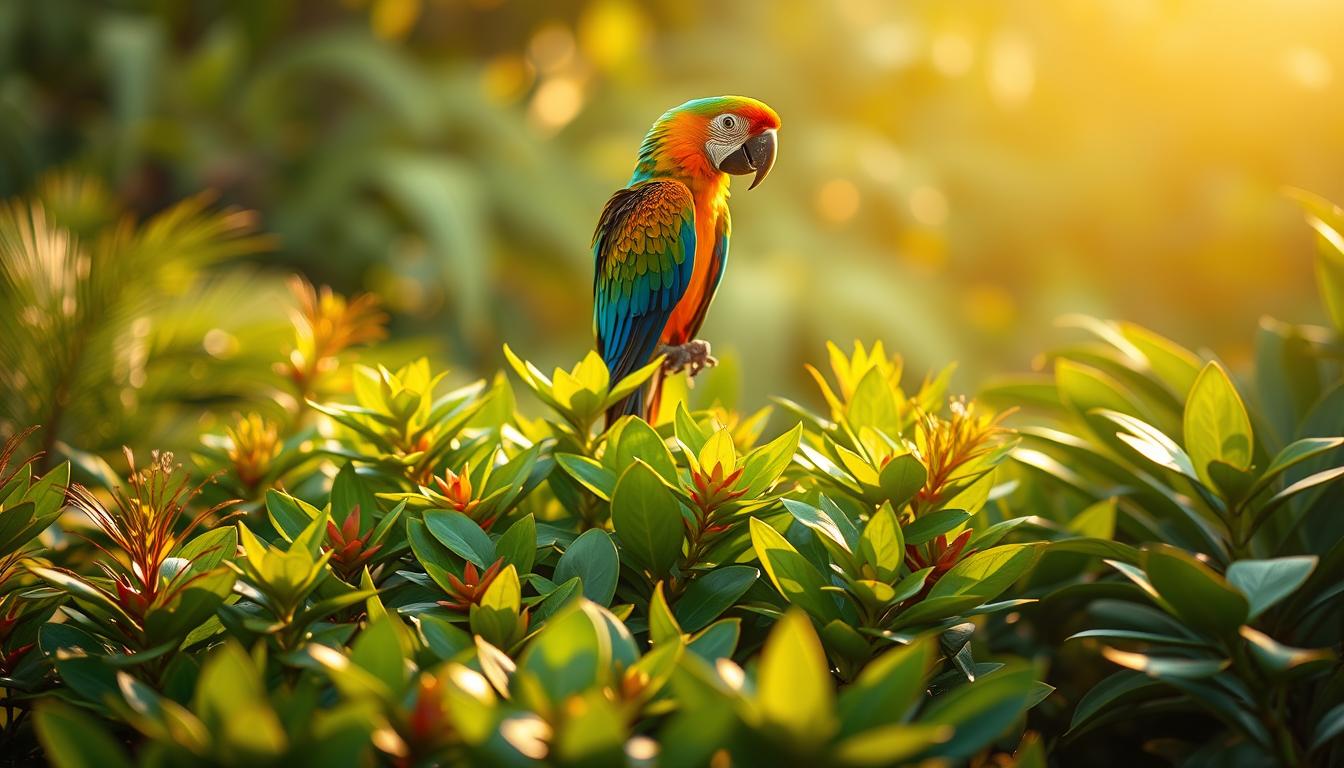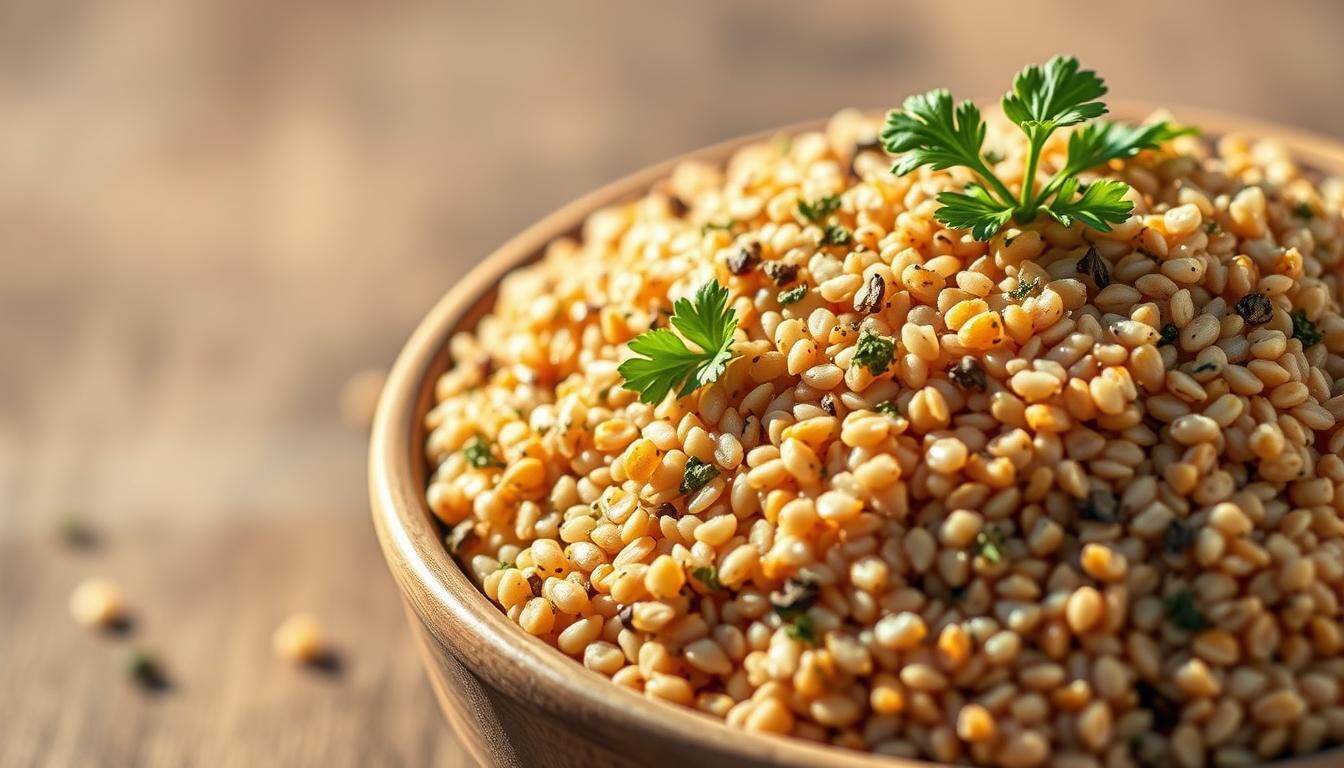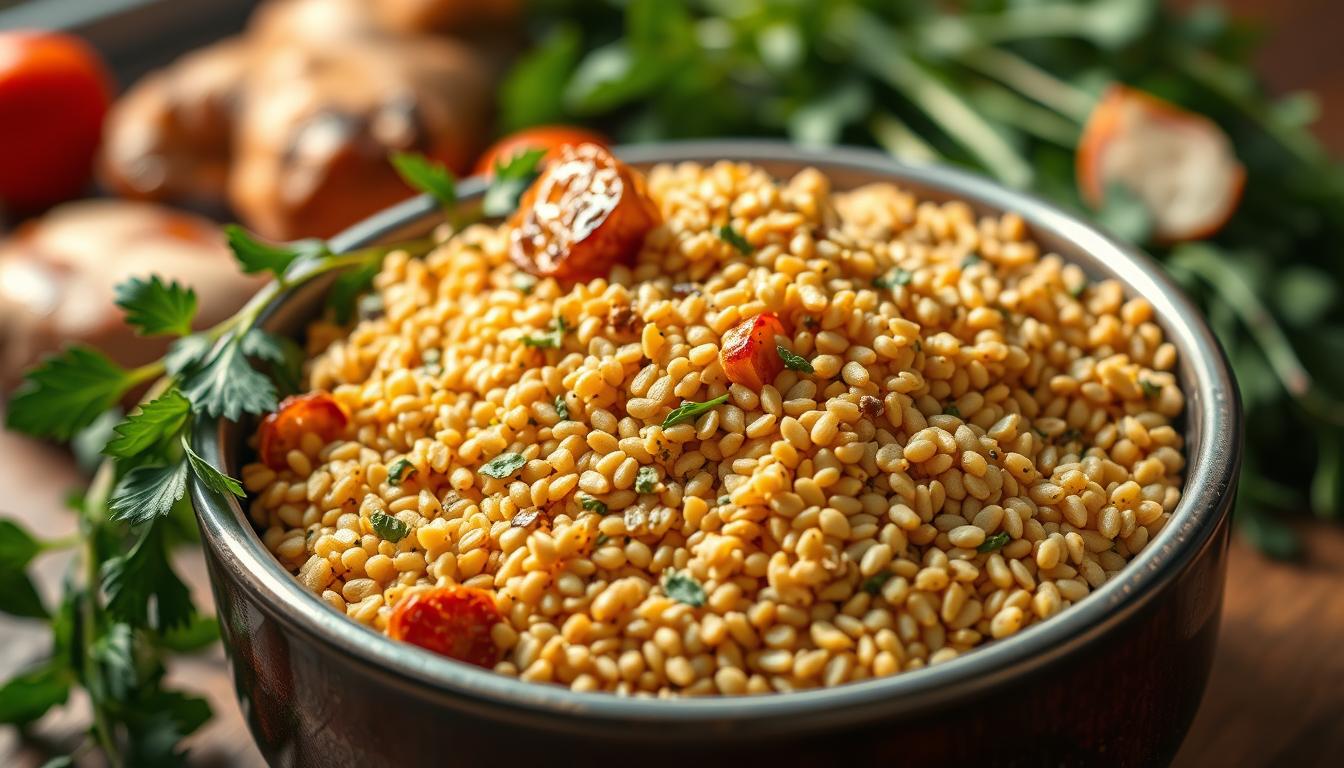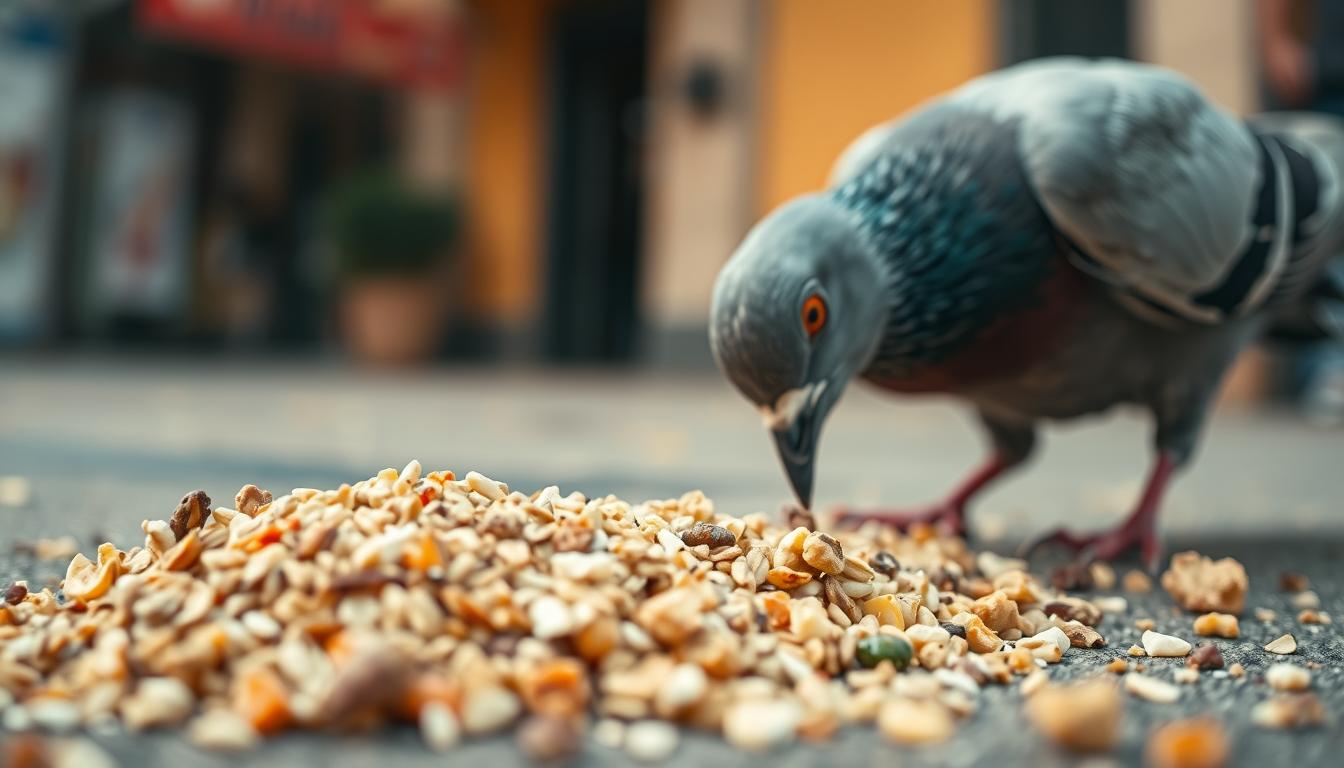Ever wondered why some parrots live for decades while others don’t make it past a few years? The secret to a long life for parrots isn’t luck. It’s knowing what to do. With the right care, your parrot could live 50 years or more.
Parrot life spans vary a lot. A Budgerigar might live 5-10 years, but a Macaw can live up to 60-80 years. Knowing about parrot longevity is not just interesting. It’s also key for taking good care of your bird.
Every parrot owner wants a bird that lives a long, happy life. The difference between a short-lived bird and a long-lived one comes down to seven important secrets. These secrets can make a big difference in your parrot’s health and happiness.
This guide will show you the best ways to help your parrot live a long life. We’ll talk about everything from nutrition to keeping your parrot’s mind active. We’ll cover all you need to know to help your bird live its best life.
Are you ready to learn the secrets of a long life for parrots? Let’s start a journey that could add years, even decades, to your bird’s life.
Table of Contents
Understanding Parrot Longevity: An Overview
Parrot ownership is a journey filled with wonder and learning. These birds are smart and colorful, making great friends for life. Their lifespan varies a lot, depending on the breed.
Before getting a parrot, it’s important to know the lifespan differences. Here are some key points:
- Large parrots like Macaws and African Grey Parrots can live 30 to 80 years.
- Smaller parrots, such as Budgies, usually live 10 to 15 years.
- Cockatiels can live 15 to 20 years.
Exploring Parrot Species Diversity
The Psittacidae family has 333 parrot species, each unique. The Psittacinae subfamily, known as “true” parrots, is the biggest group.
Key Factors Influencing Parrot Longevity
Your parrot’s life span depends on several things:
- Genetic background
- Quality of diet
- Living environment
- Veterinary care
- Mental stimulation
Knowing these factors can help your parrot live a long, healthy life. It ensures a happy time together.
Essential Nutrition for Longevity
Nutrition is key to keeping your parrot healthy and long-lived. A good diet can mean the difference between a happy, healthy bird and one with health problems.
Knowing what your parrot needs is important for their health. They need a variety of nutrients to stay full of life and energy.
Key Nutrients for Parrots
A good parrot diet should include:
- Leafy Greens: Kale, spinach, and collard greens are full of vitamins A, C, K, calcium, and iron.
- Fresh Fruits: Apples, bananas, and blueberries are rich in antioxidants and vitamins that boost the immune system.
- Protein Sources: Eggs, beans, and legumes help with muscle growth and energy.
- Whole Grains: Quinoa and oats give sustained energy and fiber.
- Healthy Fats: Nuts like almonds and walnuts are good for feather health.
Common Dietary Mistakes to Avoid
Staying away from bad diet choices is important for your parrot’s health. Avoid these mistakes:
- Don’t just give seeds.
- Don’t overfeed foods high in fat.
- Make sure to offer a variety of foods.
- Avoid giving toxic foods like avocado or chocolate.
- Don’t forget to change up the food regularly.
With a well-thought-out diet, you can greatly improve your parrot’s life and maybe even extend it.
The Role of Mental Stimulation in Lifespan
Mental health is very important for your parrot’s happiness and long life. Parrots are smart and need fun challenges to stay well. Knowing how parrots behave helps you give them the right mental play.
Fun activities are key to stop boredom and keep your parrot’s mind sharp. These activities keep your bird happy and healthy for a longer life.
Importance of Enrichment Activities
Mental play for parrots is more than just fun. It’s essential for their mental health. Here are some ways to keep your parrot’s mind active:
- Change toys every week to keep things new
- Try puzzle feeders to test their problem-solving skills
- Give them foraging tasks that feel like hunting
- Use toys that need hands-on play
Signs of Boredom in Parrots
It’s important to know when your parrot is bored. Look out for these signs:
- Excessive feather plucking
- Too much talking
- Being too aggressive or breaking things
- Not wanting to play with you
By adding fun activities and watching your parrot’s mood, you can make their life better. This might even help them live longer.
Social Needs: Companionship and Interaction
Parrots are very social and need meaningful interactions. Knowing how they behave is key to keeping them happy and healthy. These smart birds need to stay engaged to stay mentally and emotionally well.
Benefits of Socializing Your Parrot
Socializing your parrot is more than just playing with them. Studies show that 70% of parrot owners see better behavior when their birds join family activities. The right way to handle parrot behavior can really improve their life.
- Reduces stress and anxiety
- Prevents behavioral issues like feather plucking
- Enhances mental stimulation
- Strengthens bond between bird and owner
Recognizing Healthy Social Behavior
Every parrot shows healthy social behavior in their own way. Look for signs of engagement such as:
- Vocalization and mimicking sounds
- Seeking physical contact
- Displaying curiosity about surroundings
- Responding to your voice and movements
Experts say you should spend 1-2 hours a day with your parrot. This time helps prevent boredom and meets their complex social needs. It leads to a happier, longer life for your bird.
Proper Housing for a Long Life
Creating the perfect home for your parrot is key for their health and long life. Parrot care tips show that a well-designed living space greatly affects your bird’s wellness and lifespan.
Optimal Cage Size and Features
Your parrot’s cage is more than a place to live—it’s their safe haven. When picking a cage, keep these important parrot health tips in mind:
- Minimum cage size: At least 30 inches long, 18 inches wide, and 20 inches tall
- Bar spacing must prevent escape or injury
- Provide multiple perches of varying diameters
- Include food and water stations away from perching areas
Importance of Cleanliness and Safety
Keeping a clean environment is vital to prevent disease. Follow these parrot care tips for the best cage maintenance:
- Clean the cage thoroughly weekly
- Replace cage liner daily
- Disinfect food and water containers regularly
- Remove droppings and uneaten food promptly
A spacious, clean cage lets your parrot stretch, play, and flourish. Remember, your bird’s living space greatly affects their health and lifespan.
Regular Veterinary Care
Keeping your parrot healthy means being proactive about vet visits. Parrots are experts at hiding when they’re sick. So, regular vet checks are key to catching health problems early. This helps your parrot live a longer, happier life.
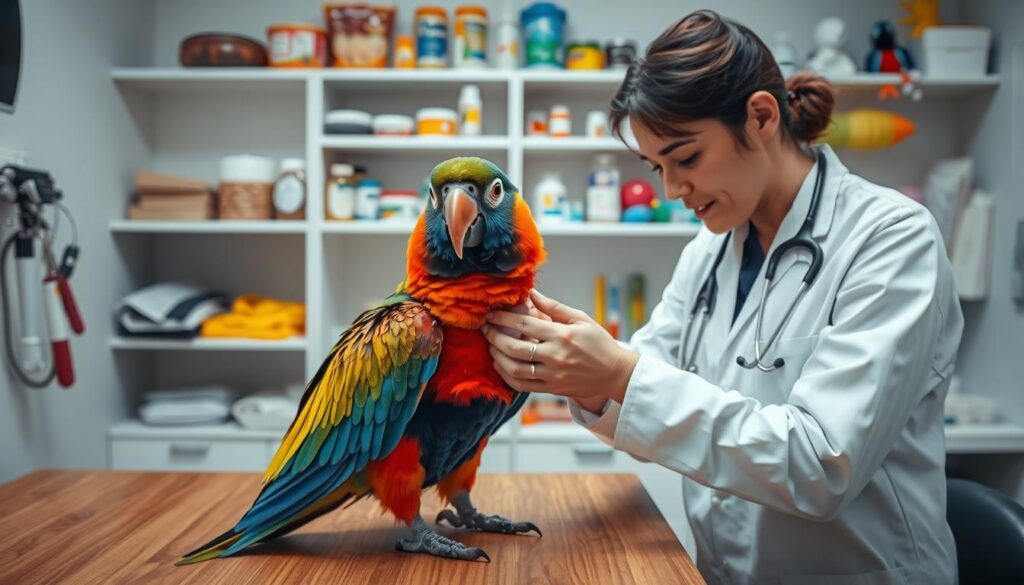
Essential Check-Ups for Your Parrot
Regular vet visits are a must for parrot care. These visits should include:
- Annual comprehensive physical examinations
- Blood work and diagnostic testing
- Weight and body condition assessment
- Beak and feather evaluation
- Parasite screening
Vaccinations and Preventive Treatments
Protecting your parrot from health risks is important. Avian veterinarians recommend specific treatments based on your parrot’s species and health.
- Routine deworming protocols
- Vaccination against specific avian diseases
- Nutritional counseling
- Behavioral health assessments
Finding a good avian vet is crucial for your parrot’s health. Regular vet visits can prevent health problems. This ensures your parrot lives a long, happy life.
Understanding Common Health Issues
Parrot health needs careful attention and early action. Your bird can face many health problems. Spotting early signs is crucial for their health and life span.
Parrots are sensitive and can get sick easily. It’s important to watch their health closely. Regular checks help keep them well.
Recognizing Symptoms of Illness
Look out for these signs of illness:
- Changes in feather appearance or excessive feather plucking
- Unusual breathing patterns or respiratory distress
- Significant shifts in eating habits
- Decreased activity levels or lethargy
- Unexplained weight loss or gain
Preventive Care Strategies
Here are ways to keep your parrot healthy:
- Schedule regular veterinary check-ups with an avian specialist
- Maintain a balanced, species-appropriate diet
- Ensure a clean, stress-free living environment
- Provide mental stimulation through interactive toys
- Monitor weight and nutritional intake
Early detection and professional intervention are key to managing potential health challenges in parrots. Your dedication to their health can ensure a long, happy life for your parrot.
Exercise and Physical Activity
Physical activity is key to keeping your parrot healthy and happy. Just like us, parrots need to move to stay fit and prevent obesity. It also keeps their minds sharp. Good parrot care includes making sure they get enough exercise every day.
Parrots are smart birds that need to stay active. If they don’t get enough exercise, they can get sick and unhappy. It’s important to keep them moving to ensure they live a good life.
Benefits of Regular Exercise
- Maintains healthy body weight
- Strengthens muscle tone
- Improves cardiovascular health
- Reduces risk of obesity-related diseases
- Enhances mental stimulation
Creative Ways to Encourage Movement
Make your parrot’s exercise fun and engaging. Here are some ideas:
- Interactive Play Stations: Set up play areas with ropes, ladders, and perches
- Try foraging toys that need to be figured out
- Practice flying in safe, closed spaces
- Use puzzle toys for problem-solving and movement
- Have daily supervised time outside of their cage
Every parrot is different, so they need different exercise. Talking to a vet can help you find the best activities for your parrot. This way, you can keep them healthy and happy for a long time.
Aging in Parrots: Specific Needs
When your parrot gets older, it’s key to know how to care for them. They need special attention to stay happy and comfortable. This is important as they go through different stages of aging.
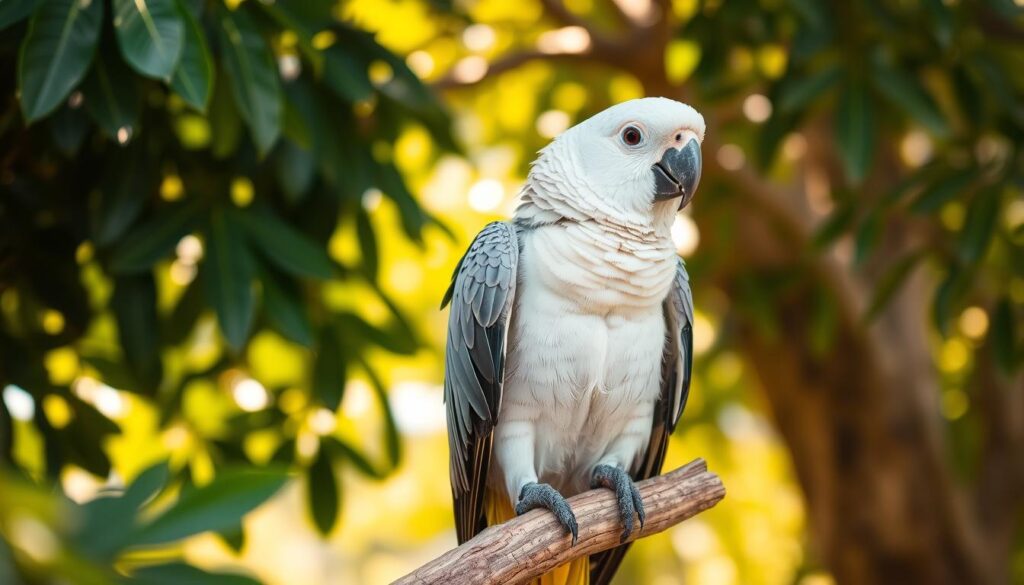
For older birds, it’s important to notice small changes and adjust their routine. Different parrots age at different rates. For example, bigger birds like African Greys and Macaws age slower than smaller ones.
Adjustments for Senior Parrots
As your parrot ages, you’ll need to make some changes:
- Change their diet to help with a slower metabolism
- Give them softer food
- Reduce how much they eat
- Make their exercise gentler
Recognizing Signs of Aging
Look out for these signs of aging in your parrot:
- Less ability to move
- Feather changes
- Less energy
- More sleep
- Possible vision or hearing loss
Knowing these signs helps you care for your aging parrot. You can make sure they stay comfortable and happy in their golden years.
The Impact of Environment on Longevity
Creating the perfect habitat is key for your parrot’s health and long life. Your feathered friend’s environment greatly affects their well-being. It can also greatly impact their lifespan. Proper care tips focus on creating an ideal living space that supports their health.
Temperature and humidity are very important for parrot health. Different parrot species have unique needs. But most do well in consistent conditions.
Ideal Temperature and Humidity Levels
- Maintain room temperature between 65-80°F (18-27°C)
- Keep humidity levels around 50-70%
- Avoid sudden temperature changes
- Use a hygrometer to monitor humidity accurately
Reducing Stress in Your Parrot’s Habitat
Stress can shorten your parrot’s life. A calm, predictable environment helps prevent health issues from stress.
- Place the cage in a quiet area
- Minimize loud noises and sudden movements
- Provide consistent daily routines
- Ensure adequate natural and artificial lighting
By following these care tips, you can create a stable, comfortable environment. This supports your bird’s long-term health and happiness. Remember, a well-designed habitat is key to ensuring your parrot lives a full, vibrant life.
Natural Lifespan vs. Life in Captivity
Wild and captive parrots have different lifespans. This shows how amazing these birds are. Captive parrots often live longer than their wild counterparts.
Wild parrots face many dangers. Predators, harsh weather, and limited food can shorten their lives. They also lack access to medical care.
In contrast, domesticated parrots get:
- Consistent nutrition
- Veterinary healthcare
- Protection from predators
- Regular mental stimulation
Lifespan Variations Across Parrot Species
Parrot species vary greatly in how long they live. Large parrots like macaws and cockatoos can live 25-50 years in captivity. Some even live into their 80s.
- Cockatoos can live over 40 years
- Macaws have been documented living into their 80s
- African grey parrots can reach 40-60 years with proper care
Conservation and Ethical Considerations
While captive environments can extend parrot lifespans, responsible ownership is key. Supporting conservation helps protect wild parrots. It ensures these smart birds thrive in their natural homes.
Understanding each parrot species’ needs helps provide the best care. This maximizes their lifespan and quality of life.
Conclusion: Making Every Year Count
Successful parrot ownership needs dedication and understanding. It’s more than just taking care of a pet. With the right care tips, you can make your parrot’s life better and maybe even longer.
Your hard work in caring for your parrot can really pay off. Parrots can live from 8 to 50 years, and sometimes even longer. By focusing on their diet, keeping them mentally active, and social, you help them stay healthy and happy.
Being a parrot owner is a big job that keeps getting bigger. Learning about their needs, from food to fun activities, makes your bond stronger. By being proactive, you can avoid health problems and help your parrot live a long, happy life.
Embracing the Journey
Every parrot is special and has its own personality. Your love, patience, and time are key to a happy life for your bird. Keep learning, stay alert, and enjoy the amazing connection you share with your parrot.
FAQ
How long do parrots typically live?
Parrots live different lengths of time based on their species. Small parrots like budgies might live 5-10 years. But bigger ones, like macaws and African greys, can live 50-80 years or more with good care. Some, like the Hyacinth Macaw, could live up to 90 years in captivity.
What is the most important factor in extending a parrot’s lifespan?
The key to a long life for parrots is comprehensive care. This means giving them the right food, regular vet visits, mental games, social time, and a clean, safe home. Diet and health are especially important, as they affect their overall well-being.
How often should I take my parrot to the veterinarian?
Healthy parrots need an annual vet check-up. Young and older birds might need more visits. If you notice any changes in their behavior, appetite, or looks, see a vet right away.
What diet is best for maximizing my parrot’s lifespan?
A good diet includes fresh fruits, veggies, high-quality pellets, and a little bit of seeds. Avoid foods high in fat and sugar. Make sure they get a variety of nutrients. Talk to an avian nutritionist for a diet plan that’s just right for your parrot.
How much social interaction do parrots need?
Parrots need lots of social time, several hours a day. This can be with people, playing, training, and mental games. Without enough social time, they can get stressed, depressed, and have behavioral problems.
What size cage do parrots need?
The cage size depends on the parrot species. It should be big enough for them to spread their wings, move around, and have toys and perches. A good rule is to choose a cage that’s at least 1.5 to 2 times their wingspan.
How can I prevent boredom in my parrot?
Give them lots of toys and change them often. Use puzzle feeders, teach them tricks, and play together. Activities like foraging toys, music, and learning new tricks keep their minds sharp.
What are common health issues in parrots?
Parrots often face health problems like respiratory infections, psittacosis, nutritional issues, feather picking, and beak and foot problems. Regular vet visits and a clean, stress-free home can help prevent many of these.
Do different parrot species have different care requirements?
Yes, each parrot species has its own needs for diet, cage size, social time, and environment. Learn about your parrot’s specific needs and health concerns to care for them properly.
How can I prepare for my parrot’s senior years?
As parrots get older, they may need softer food, easier perches, less exercise, and more vet visits. Look out for signs of aging like less mobility, changes in feathers, and less appetite. Adjust their care to keep them happy and healthy.
Source Links
- Why Do Parrots Live So Long? – https://vocal.media/petlife/why-do-parrots-live-so-long
- Do Parrots Make Great Pets? Guidance, Facts & FAQ | PangoVet – https://pangovet.com/pet-lifestyle/birds/do-parrots-make-great-pets/
- How Long Do Parrots Live? And Other Animals That Outlive Us! – https://martyandlaurashow.com/how-long-do-parrots-live/
- Parrot | Description, Types, & Facts | Britannica – https://www.britannica.com/animal/parrot
- Top 10 Whole Foods for Parrots: A Natural and Nutrient-Rich Diet – https://mikeyandmia.co.uk/blogs/diet/top-10-whole-foods-for-parrots-a-natural-and-nutrient-rich-diet
- How Long Do Parrots Live? Tips for a Longer Life – https://www.birdsprees.com/blogs/news/how-long-do-parrots-live-tips-for-a-longer-life?srsltid=AfmBOoqkznTZAZGKNY57vd5mjXKP_WyUjIQwB9AcSXk0ndGMrrJmHxhN
- What to Feed Your Pet Bird – https://www.petassure.com/maxscorner/what-to-feed-your-pet-bird/
- How Long Do Parrots Live? Tips for a Longer Life – https://www.birdsprees.com/blogs/news/how-long-do-parrots-live-tips-for-a-longer-life?srsltid=AfmBOopmDgntijtMwvRfapUipmPpMJxBiOy4c_DQvmUPcjmR95v163rd
- Understanding Parrot Lifespan: Comprehensive Conclusions from Key Factors – https://poparrots.com/2024/03/12/understanding-parrot-lifespan-comprehensive-conclusions-from-key-factors/?srsltid=AfmBOop1vNubj_ut-kxDbYWSvZJntlGpccspjRBj2JELxzJx3Dk8RWk_
- The Ultimate Guide to Parrot Care: Ensuring a Happy and Healthy Feathered Friend – https://www.gardenstatepetcenter.com/blogs/news/the-ultimate-guide-to-parrot-care-ensuring-a-happy-and-healthy-feathered-friend?srsltid=AfmBOoq4MGxp00-YxRO54cHls9q8gsYBuMzH3dnhRJZquVaWEDjiDad6
- How Long Do Parrots Live? Tips for a Longer Life – https://www.birdsprees.com/blogs/news/how-long-do-parrots-live-tips-for-a-longer-life?srsltid=AfmBOoqABO0luTZOrVHcKnA_yWTJuIDYyuZ4s7O3VW3e9hNYwBtBoWPi
- Understanding Parrot Lifespan: Comprehensive Conclusions from Key Factors – https://poparrots.com/2024/03/12/understanding-parrot-lifespan-comprehensive-conclusions-from-key-factors/?srsltid=AfmBOooUDbFHepuCOpn7ClBZkoUtZ9WtvnnYtqaBuLDCVDKqxVbrSerc
- The Ultimate Guide to Parrot Care: Ensuring a Happy and Healthy Feathered Friend – https://www.gardenstatepetcenter.com/blogs/news/the-ultimate-guide-to-parrot-care-ensuring-a-happy-and-healthy-feathered-friend?srsltid=AfmBOoo4-GYtoSI_73ZzggwlmqeXFilzJN4WpLdGX25rKGDOBAw9ja8u
- Birds – https://www.cdc.gov/healthy-pets/about/birds.html
- Quaker Parrot Lifespan (How Long do Quaker Parrots Live) – https://www.linkedin.com/pulse/quaker-parrot-lifespan-how-long-do-parrots-live-dr-anees-ashraf-sbr0f
- How Long Do Parrots Live? – https://www.petmd.com/bird/how-long-do-parrots-live
- How Long Do Parrots Live? – https://www.thesprucepets.com/how-long-do-parrots-and-other-pet-birds-live-1238433
- How Long Do Parrots Live? Understanding the Lifespan of These Fascinating Birds – https://medium.com/@webfinxis/how-long-do-parrots-live-understanding-the-lifespan-of-these-fascinating-birds-6051d2950f8d
- Understanding Parrot Lifespan: Comprehensive Conclusions from Key Factors – https://poparrots.com/2024/03/12/understanding-parrot-lifespan-comprehensive-conclusions-from-key-factors/?srsltid=AfmBOorBX7zldjln-I4Id3L_C0taciQx8EuVFbTNWMDSph6DF-B5j2iN
- How Long Do Parrots Live? Tips for a Longer Life – https://www.birdsprees.com/blogs/news/how-long-do-parrots-live-tips-for-a-longer-life?srsltid=AfmBOoqU7B0xr1D47xXTFPJuqGb5JgX0Bd71a0JL_MWTzm-LS4attlGH
- How Old Does a Parrot Get? – Avonturia – https://avonturia.com/hoe-oud-wordt-een-papegaai/
- Parrot Lifespan Guide: Age, Expectancy & More | Johnston & Jeff – https://johnstonandjeff.co.uk/lifespans-of-parrots-explained/
- How Long Do Parrots Live? – https://be.chewy.com/how-long-do-parrots-live/
- How Long Do Parrots Live? Tips for a Longer Life – https://www.birdsprees.com/blogs/news/how-long-do-parrots-live-tips-for-a-longer-life?srsltid=AfmBOooaM7MAovQDgs-pKKdorBz3I6TgiwoyhEi–rfPIQwRnTPKl9Tj
- Bird Life Expectancy – How Long Can Birds Live? – https://www.birdfy.com/blogs/blogs/bird-life-expectancy-how-long-can-birds-live?srsltid=AfmBOorUFL9sO07-keSutw_7yRcfXXG5WJr-rlefGS9LlCreZZ4r3piw
- How Long Can Parrots Live? | PetMojo – https://www.petmojo.com/how-long-can-parrots-live/
- Parrot – https://en.wikipedia.org/wiki/Parrot
- What are the priority welfare issues facing parrots in captivity? A modified Delphi approach to establish expert consensus | Animal Welfare | Cambridge Core – https://www.cambridge.org/core/journals/animal-welfare/article/what-are-the-priority-welfare-issues-facing-parrots-in-captivity-a-modified-delphi-approach-to-establish-expert-consensus/64E8B6F1F3FFC5D7E5107B6F2BA0BD68

